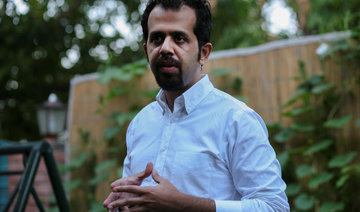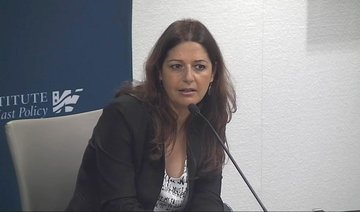BRATISLAVA, Slovakia: Murdered Slovak journalist Jan Kuciak was about to publish an investigation alleging high-level political corruption linked to the Italian mafia, the news portal he worked for revealed Wednesday, as the killing stoked concerns about graft and press freedom in the small EU state.
The weekend killing of Kuciak and his fiancee has sent shockwaves through Slovakia and drawn international condemnation, with organizations including the EU and UN calling for a swift and thorough investigation.
Kuciak, 27, reported for the aktuality.sk news portal owned by German-Swiss Axel Springer and Ringier media group and focused on fraud cases involving businessmen with links to Prime Minister Robert Fico’s governing SMER-SD party and other politicians.
At the stroke of midnight, aktuality.sk and several other news sites published Kuciak’s last, unfinished investigative report on possible political links to Italian businessmen with alleged ties to Calabria’s notorious ‘Ndrangheta mafia supposedly operating in eastern Slovakia.
“Two people from the circles of a man who came to Slovakia as someone accused in a mafia case in Italy have daily access to the country’s (Slovakia’s) prime minister,” Kuciak wrote in the article titled “Italian mafia in Slovakia. Its goblins extend into politics.”
“Italians with ties to the mafia have found a second home in Slovakia. They started doing business, receiving subsidies, drawing EU funds, but especially building relationships with influential people in politics — even in the government office of the Slovak Republic,” Kuciak added.
“They owned or still own dozens of companies. Their property is worth tens of millions of euros,” he wrote.
Slovakia’s leading SME broadsheet daily had first revealed the details of Kuciak’s investigation on Tuesday morning.
The SME report triggered a stern rebuke from Fico, who showed reporters stacks of euro bills totaling the one million euro ($1.2 million) reward he has offered for information that could lead to the killers.
“Do not link innocent people without any evidence to a double homicide. It’s crossing the line. It’s no longer funny,” he warned journalists.
Police found Kuciak and Martina Kusnirova shot dead on Sunday at his home in Velka Maca, a town to the east of Bratislava.
He died from a gunshot wound to the chest while his partner was shot in the head, according to police who also reportedly found ammunition arranged around the bodies with the Pravda daily describing the scene as a “warning.”
The shooting followed the October murder of campaigning Maltese journalist Daphne Caruana Galizia — who exposed crime and corruption on the Mediterranean island — in a car bombing.
Candlelit vigils have been held for the couple, and there are calls for fresh anti-corruption protests in Slovakia after a wave of demonstrations last year.
Police commander Tibor Gaspar, who has said the the motive was “most likely” related to Kuciak’s investigative journalism, warned reporters that publishing details of the case could tip off suspects.
“How can we do our work effectively if you are alerting some people who may be involved?”
Tom Nicholson, a British-born investigative journalist who worked closely with Kuciak wrote that “the (Slovak) secret service already has the gangsters’ names; both Jan and I were operating from leaked intelligence documents” in an article for Politico.
“Slovak organized crime has never killed reporters, even in the bad old days. Whereas Italy’s mafia gangs have shown no such compunctions,” Nicholson said.
Political analyst Grigorij Meseznikov said the murder and its possible links to the Slovak political elite “could prompt a political earthquake.”
“A red line has been crossed. This case could shake the electorate of the governing SMER-SD party to its foundations.”
Fico is known for his sharp criticism of the media, once telling journalists in 2016 they were “dirty, anti-Slovak prostitutes.”
But he met the editors of top media outlets on Tuesday, saying he wanted to assure them “that the protection of freedom of speech and the safety of journalists is our common priority and that it is extremely important to my government.”
Arpad Soltesz, a journalist with TV JOJ and a former colleague of Kuciak, said the slain reporter had been writing about tax fraud at the “highest levels of Slovak politics.”
“To murder a journalist for their work, that is maybe possible in the Balkans, maybe in the Middle East, it definitely happens in Russia, but not in the European Union,” he said.
“There is only one answer to this kind of act — to finish his work.”
Last year, thousands of mostly young Slovaks joined anti-corruption protests demanding the dismissal of senior government and police officials for alleged foot-dragging on fighting graft.
Transparency International ranks Slovakia as the seventh most corrupt EU member.
Murdered Slovak journalist ‘was probing Italian mafia links’
Murdered Slovak journalist ‘was probing Italian mafia links’

Tunisian journalist Chatha BelHajj Mubarak freed after sentence cut

- The court cut her sentence from five years to two, making her eligible for immediate release, her brother told Reuters
TUNIS: A Tunisian appeal court on Wednesday ordered the release of journalist Chatha BelHajj Mubarak, jailed since 2023 in a conspiracy case, after reducing her prison sentence, her family said.
The court cut her sentence from five years to two, making her eligible for immediate release, her brother told Reuters.
She was convicted in the so-called “Instalingo” case, which involved politicians, media figures and other defendants accused of conspiracy and financial crimes. BelHajj Mubarak denied the charges.
“Chatha is free and leaving prison,” her brother, Amen BelHajj Mubarak, said.
He said her health had severely deteriorated during her time in prison. She suffered serious complications, including significant hearing loss, and was diagnosed with cancer in detention, he added.
Tunisian authorities have said the case stems from judicial investigations into alleged financial and security-related offenses, and have rejected accusations by opposition groups that the prosecutions were politically motivated.
Tunisian prosecutors are pursuing a number of high-profile conspiracy cases involving politicians, journalists and activists. Several opposition leaders have received lengthy prison terms.














